On Friday, May 18, 2001, a group of 12 gathered at Peyton's Place near Tahlequah, Oklahoma to camp for the weekend and paddle the Illinois River. Included in the group were Jerry and Janelle Johnson, Bryan Jackson, Mike O'Neill, Fraser and Terri Border, Roger Vanderlaan, Angie McCutcheon, Doug Bryans, Richard and Yuko Headley and Marc McCord. Our intention was to do a Saturday paddle from Peyton's Place down to the Echota Public Access, then do a shorter stretch on Sunday before returning home.
On Thursday, the Tahlequah gauge read 3.43 feet and 373 cfs, just slightly above the 2.8 feet minimum for a paddle without dragging. By Friday morning the gauge had jumped to 4.3 feet and 866 cfs. We were in great shape! So, on Friday night we had a bunny burn - a meal of roasted rabbit, carrots, potatos, onions and wheat rolls around a campfire. We were set to paddle. By Saturday morning the river had risen to about 5.6 feet and 2,250 cfs - it was a beautiful site! The Illinois is a flatwater river, so rocks and rapids are not a concern. We were not going to have to paddle hard, if at all, to get to our takeout 17 miles downriver. Fraser initialized his GPS receiver and we put in. Without paddling a stroke we were clocking 11 mph - THAT'S FAST! We decided that we would make the 17 mile run, eat lunch at the takeout, shuttle ourselves back to the top, then paddle another 17 miles.
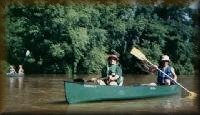
Jerry and Janelle Johnson |
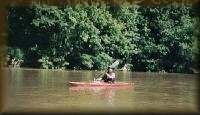
Bryan Jackson |
The river was rife with "occasional boaters", people who had no business being on that river at that level. Most were not wearing PFDs and none seemed to have gear lashed to their boats. Some were families with young kids while others were typical rowdy young adults out for a good time on a beautiful, warm day. Some obviously had too much beer before they ever got on the river. There were a large number of very large downed trees of the Oak and Sycamore variety which had washed into the river over the years due to heavy rains, and some of them had come down recently, though most showed the classic signs of being downed for quite awhile. Normally, these are barely in the river and pose little danger, but at high water levels the character of the river changes dramatically and these trees become "strainers" - things in the river that water passes through and people and boats do not. So it was on this weekend.
We were nearing a landmark known as Elephant Rock, a place on river right where, with a vivid imagination one could convince himself or herself that it looked like an elephant head and trunk cut from the flint rock of the Tahlequah area, when we came upon two very large trees laying into the river across the natural channel. There was one low spot where a boat could safely pass over, and Jerry and Janelle nailed it. Next came Terri, but she was bumped out by a boat of those "occasional boaters" and it put her in instant peril. Her boat hit the strainer, capsized, dropped her into the river and pinned the boat with the bow sticking up and the cockpit pointed downriver. Fortunately, Terri flushed out about a tenth of a mile downriver and was all right.
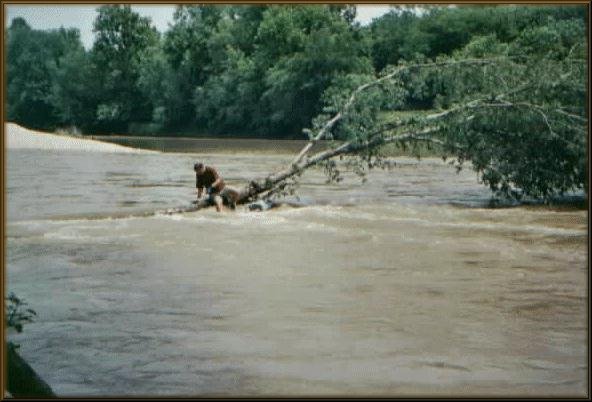
Marc McCord rescueing a pinned kayak on the Illinois River, May 19, 2001, at 2,250 cfs
Photo by Janelle Johnson
Seeing somebody in the water and a pinned boat in a strainer, I immediately headed my boat over to see if I could help. As Angie and I approached the strainer my view was blocked by Angie, and while I could clearly see Terri's boat, which I then recognized, my view of the clear channel was blocked and the fast moving current carried us into the strainer. I attempted to rudder out to line up the boat, but the strong current overcame my best efforts and we hit the Oak slightly bow first, then broadsided it. Instinctively, I leaned toward the tree and grabbed for it to stabilize the boat, but Angie leaned upriver, and we immediately capsized dropping us both into that fast current. We were swept under the boat in a heartbeat, and as we went under the boat it swamped and sank due to the forces of the current, with the gunwales pointed upriver pinning it solidly against those trees. Being an Old Town Discovery Scout, it would not sink to the bottom, so the current held it firmly in place.
My swiftwater rescue training started running through my mind and I knew I had to avoid being killed by branches and leaves holding me down. I was facing upriver (I could tell by the current on my face) and used my hands to push myself under those branches of the Oak and Sycamore which were in the river. The water was about 11 feet deep and thankfully there were no real entanglements down there, so I popped up about 15 or 20 yards downriver. Bryan thought I was down there a long time, but it seemed to me like only about 30 seconds or less, and I had plenty of air when I reached the surface. Angie popped up about 5 to 10 seconds later, and that was a big relief.
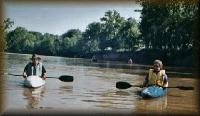
Doug Bryans and Roger Vanderlaan |
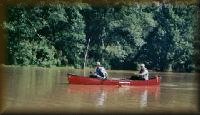
Richard and Yuko Headley |
After making sure everybody was safe we immediately began a recovery effort on our boats. Terri's boat obviously had to come out first. It was the weakest boat against that current and it was partially out of the water, with a grab loop and handle easily accesible. After what seemed like about 90 minutes (it was actually less than an hour) we freed Terri's boat and it had a few dents and dings where it had been pushed against those tree trunks and branches. My canoe was a different matter altogether. Interlocking branches of both trees were pinning the boat and it was immovable as far as sliding it forward, backward or up was concerned. It moved down slightly when I stepped on its side, but came right back up due to its excellent flotation. Doug made repeated trips to the log where I was working trying to secure ropes and free boats, bringing me water, ropes, 'biners and encouragement, and every bit of it was important to morale and the ability to accomplish our mission of recovering those two pinned boats. He had to paddle against that current and hold his boat there without capsizing. Good job, Doug, and thanks for all your help!
After a couple of hours we decided that some of the group would paddle to the takeout, get some help and additional equipment, then return in a raft to help recover my boat. As luck would have it two of their boats capsized at different times and they lost about 90 minutes recovering themselves and their boats. About four hours after they left three boats returned and a decision was made to carry us off the river by paddling and lining our boats back upriver about one mile to the nearest access point at the Sparrowhawk Camp midpoint. It was nearly 7 p.m. and the day was quickly ending, so further recsue attempts were impractical from a safety standpoint.

On Saturday night we dined on rabbit stew made from leftovers of our Friday night meal. It was really good after a day of hard work. Due to impending inclement weather several of our group decided to head for home, leaving Fraser and Terri, Mike, Bryan, Angie and myself to finish the rescue. Fraser and Terri had both slightly injured shoulders during our ordeals on Saturday, so Terri and Angie stayed in camp while the four guys went after my boat. I had awakened early and at 6 a.m. set off to see if it had washed out overnight. It had not. We drove down to Sparrowhawk Camp where Colleen Wilson loaned us a raft and bow saws and provided a shuttle to their midpoint access where we paddled down to the "scene of the crime", so to speak. We had Mike's canoe and the raft, all our extra ropes and safety gear, but none of it mattered. We did not have what we really needed - a chainsaw. So, after about three hours of failed efforts we paddled on down to Sparrowhawk Camp where we met up with John Cook and Rob Smith.
John grabbed a chainsaw and we loaded the raft onto his truck and headed back to the Sparrowhawk midpoint to resume our efforts with John going along this time. We left Mike's canoe on Bryan's truck and took the raft. Fraser's arm was really hurting, so we decided it was best that he not come with us since it could have resulted in his further injury or possibly even a worse situation if he had to swim for his life. The chainsaw worked wonders and we sent several branches downriver and out of our way. Then, the chainsaw died, and we were just about out of luck. However, there were three Cherokee men fishing the river and we enlisted their help. The group of seven lifted the tree trunk of the Sycamore and one of the Cherokee grabbed my boat and pulled it backward. Viola! It popped to the surface, full of water but otherwise all right. I had already removed all my gear bags and throw bag while John was chainsawing the branches so the boat was empty. I guided it downriver about a quarter mile until I could get it to the bank where I emptied it and gave it a close examination. There was one small ding in the portside gunwale and a few scrapes, but the boat was otherwise undamaged and completely seaworthy. That is why I love to paddle Old Town canoes. Most other boats would have been destroyed from being under water in 2,250 cfs for 30 hours of being pushed against tree trunks and branches. The recovery effort on my boat consumed about 16 hard hours by four people.
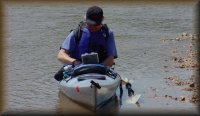
Fraser Border |
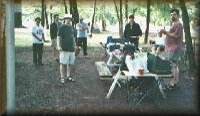
Preparing dinner on Saturday night |
After well deserved congratulations and many thanks to all the people who helped in this rescue and recovery Mike and Bryan took the raft and John and I paddled the canoe to the takeout at Sparrowhawk Camp's headquarters. Thanks to the assistance of Sparrowhawk Camp and its employees Rob Smith, John Cook and Colleen Wilson we were able to turn what could have been a costly tragedy into an adventure and a test of stamina and intestinal fortitude resulting in a successful recovery. Thank you, Sparrowhawk and staff, for your friendly and cooperative spirit in helping us. We could not have done it without you!
Upon arrival back at Peyton's Place we found Angie wondering if she was trapped on the river all alone. Mike and Bryan were ready to leave almost immediately and I was not. I had not eaten and was dog tired, wet and hungry, and had promised John Cook and his wife a great meal, so Angie rode home with Bryan while I cleaned up and started preparing a meal of Cajun grilled chicken, jalapeno blackeyed peas, hominy and hot wheat rolls, topped off with Mike's Dutch oven cherry cobbler. While we were getting ready to eat we discovered that our adventures were not over. John found a 5'2" water moccasin crawling up the road just a few feet from our campsite. The s.o.b. tried to bite me when I went to take a look, so John grabbed an iron pipe and clobbered the snake in a scene right out of the B.C. comic strip, and the snake lost his head in the encounter. His body was still writhing about an hour later. It was his bad fortune to be where he was at that late hour and be found by us. Normally, we would not have killed a snake because that is its natural environment, but being in our camp was one place it was not welcome and after all we had been through a snake bite was not looking very entertaining. I will say that this is the first time, in MANY trips to Peyton's Place, that I have ever seen or heard of a snake in the camp area, and that was probably due to the storms that came in later that night. It was probably just seeking shelter from the storm when it encountered John.
As we finished our meal and John and his wife departed a huge storm blew in with very high winds, torrential rain and lightning everywhere you looked. I struck the camp in about 30 minutes, loading a lot of very wet stuff into my Explorer, then put on dry clothes and headed for home, stopping to sleep a few hours along the way and arriving back in Dallas around 8:30 a.m. Monday. In spite of it all I managed to add 32 miles to my record and am now sitting at 372 miles paddled this year through May 20. It was a great weekend, and all I lost was a pair of Baush and Lomb sunglasses and a few hours of paddling time. My muscles ache and I was dog tired all day Monday, but my recovery is complete on Tuesday and I am ready to paddle again next weekend on the Upper Guad. It is going to be great being back "home" on my favorite river.
I want to thank the following people who made a monumental effort to help recover my boat - Fraser Border, Bryan Jackson, Mike O'Neill and Doug Bryans (all of Dallas Down River Club), Colleen Wilson, John Cook, and Rob Smith (all of Sparrowhawk Camp) and the three Cherokee gentlemen whose names I, regrettably, do not know, but who make me even prouder of my Cherokee heritage. You were all stellar in your spirit, cooperation, determination, planning, execution and attitudes. Through it all not one harsh word was spoken by or about anybody else and friends like these people are why I love to paddle. I was among old friends with whom I have paddled many miles and new ones with whom I would love to paddle many more in the future. And, I will be going back to the Illinois and patronizing Sparrowhawk Camp, where I met a group of really friendly and great people.
In summary, our group was a bunch of experienced paddlers with swiftwater rescue training and a lot of rescue gear (ropes, carabiners, pulleys, prussic loops, throw bags, first aid kits, PFDs, etc.) and we got into trouble trying to help others. During our ordeal we had to direct well over 100 other less experienced, trained and prepared paddlers away from the strainer. In spite of our best efforts several of them got into trouble anyway and nearly suffered fates far worse than our own. I would hate to imagine what would have happened had we not been there to warn people off as they approached that strainer in that fast moving current. Most were not wearing PFDs and gear was not lashed to their boats. Had we not been there it is entirely possible that several people would have died and several boats destroyed on that river on that day.
I would like to implore the State of Oklahoma and the Oklahoma Scenic Rivers Commission to remove those strainers when the water is low. They may be a natural and scenic part of that river, but they are extremely dangerous and create a death-trap on a river promoted by the State of Oklahoma and local liveries for recreational uses. It is imperative that such obstacles be removed from the natural river channels to provide a safer, more enjoyable day on the beautiful Illinois River. What, for us, was a major inconvenience and disruption of our trip could have been a complete disaster with serious injuries and/or deaths for less experienced boaters. About 95% of those we encountered were not prepared to deal with that strainer, yet the natural channel wanted to carry all boats right into it. This was personified by the guy who spilled, then immediately proclaimed, "I lost my beer!" Obviously, this was somebody with his priorities all wrong and who had already had too much beer. He never should have been on that river at that level!


